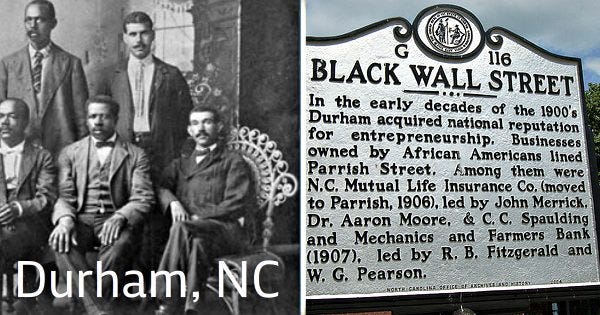As Black Business Owners Approach Retirement, Succession Planning Lags
This story is based on reporting from Next City.

Fifty by Fifty is beginning 2019 with a new series exploring city strategies for growing employee ownership. In our first article, we look at how Durham, NC, a city with a strong legacy of African-American entrepreneurial activity, is promoting employee ownership as a succession strategy for retiring African-American business owners.
Durham, North Carolina, once famous for its “Black Wall Street,” is exploring a new strategy to preserve and grow local African-American businesses through employee ownership. One of four cities chosen to participate in the Shared Equity in Economic Development (SEED) fellowship program, sponsored by the National League of Cities and the Democracy at Work Institute (DAWI), the city is preparing to reach out to African-American business owners — particularly those approaching retirement age — to encourage them to consider employee ownership when planning their succession strategies.
City-based strategies are becoming an important new tool for spreading employee ownership, as a way to preserve businesses, local economies and community wealth.
Starting in the early 20th century, Durham became a banking and finance center for black business owners. Throughout the Jim Crow era, these black businesses thrived, but in the 1960s, urban renewal and the construction of a freeway reduced economic activity. Nonetheless, the city of over 300,000, which is about 40 percent African American, still has numerous black-owned businesses, including restaurants, funeral parlors, car repair shops, and other much-needed local enterprises, many of which have been around for 30 years or more. Without plans to transfer these businesses to new owners, many could close — hurting not only the business owners who would not recover the wealth they have built, but their employees and the community that has helped them prosper.
This generational shift is only one of the forces impacting Durham’s economy and future, says Andre Pettigrew, director of Durham’s Office of Economic and Workforce Development. Pettigrew explained to Next City reporter Sandra Larson that Durham — and North Carolina more generally — has gone through a major economic transformation in just a generation. An economy once based on tobacco, textiles, and furniture has become primarily a knowledge economy. “We are at risk of gentrification — at risk of leaving underemployed and unemployed people behind, if we don’t have intentional strategies to support them,” he said.
Pettigrew sees the SEED program as an opportunity to put such a plan in place. He is part of a four-person team of SEED fellows that includes three city employees and a community fellow from the Small Business and Technology Development Center at North Carolina Central University, an historically black institution. This year’s SEED cohort includes similar teams from Atlanta, Miami, and Philadelphia. The goal, says Melissa Hoover, executive director of DAWI, is to promote peer-to-peer learning, with participants traveling to each other’s cities to share ideas and learn what works.
As they have reached out to retirement-age business owners, the Durham fellows have learned about the many challenges that face owners as they consider a succession plan. Though it can be difficult to interest a younger generation family member in taking over, or to find an outside buyer, not everyone trusts that their employees are ready to be owners. Thus, the team is considering how to provide technical assistance to both owners and employees of businesses considering an employee-ownership conversion. It’s important, says Pettigrew, to raise awareness not only among business owners, but also among technical service providers, business planners, lenders, and small business advisors.
“The City of Durham is committed to supporting employee-ownership as a tool for retaining legacy businesses and the local jobs and wealth they create.” — Deborah Giles
Concern is growing that the retirement of Baby Boomer business owners could have a devastating impact on the Main Streets of cities and towns across the country. The employee ownership community has long relied on state approaches, with a half-dozen states now having employee ownership centers and a new organization formed to create more. City-based strategies are becoming an important new tool for spreading employee ownership, as a way to preserve businesses, local economies and community wealth. The federal government has stepped in to make these transitions easier, by making loans more readily accessible through the Main Street Employee Ownership Act.
“The City of Durham is committed to supporting employee-ownership as a tool for retaining legacy businesses and the local jobs and wealth they create,” saidDurham SEED fellow Deborah Giles, director of the City’s Equal Opportunity/Equity Assurance Department. “Durham is on the leading edge of a wave of forward-looking cities committing to worker ownership as an equitable economic development strategy.”
— Karen Kahn is a writer, editor, and communications consultant. She is the editor of the Fifty by Fifty blog.
